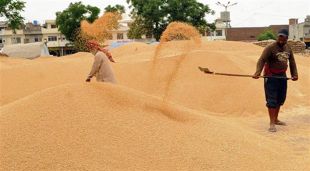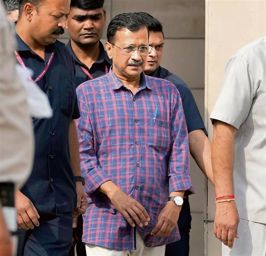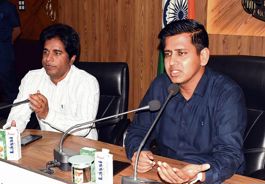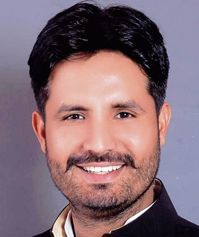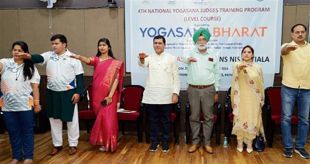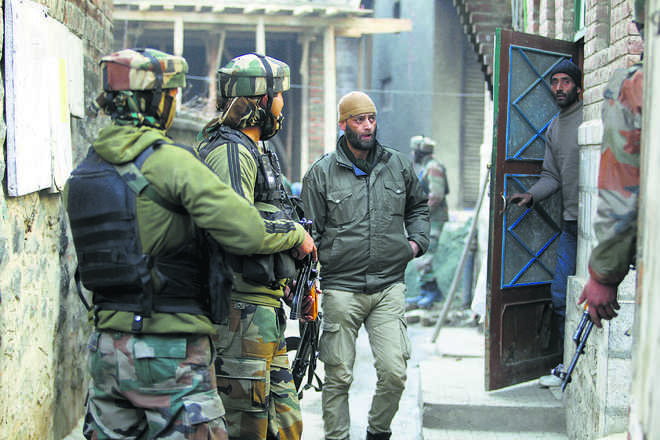
Unprecedented: Soldiers have petitioned the SC over application of AFSPA.
Col Mahesh Chadha (retd)
It is, perhaps, unprecedented in the annals of the Indian Army that a group of soldiers headed by an officer has petitioned the Supreme Court in regard to the application of AFSPA (the Armed Forces Special Powers Act), challenging the lodging of FIRs by the authorities against their acts of commission and omission while fighting the terrorists and other anti-national elements in J&K. An extreme step that is likely to have far-reaching ramifications for the discipline and morale of the troops deployed in critical situations to protect men and material, preserving the integrity and unity of the country within the terms and conditions laid by the government from time to time.
The petitioners have taken cover under the fundamental rights granted by the Constitution, but failed to take cognisance of the Supreme Court's ruling that even fundamental rights are not absolute. This is more applicable to men in uniform who are subject to the Army Act and Rules framed from time to time.
Some veteran generals have tried to clarify the importance of granting such safeguards to the troops provided in AFSPA. But their justifying petition is devoid of sound reasoning as it is likely to create an impression amongst the public that the army is no different from those who try to get their grievances resolved by the courts; more to draw attention and sympathy of the masses. These protagonists must ask themselves: would they have allowed such recourse while they were commanding units and formations? The answer would be an absolute no, as it would have meant failure of command — tantamount to mutiny.
Lt-Gen Syed Ata Hasnain (retd), former 15 Corps commander credited with taming the terrorist movement, had in these columns clarified the necessity of the FIR lodged so as to become a documentary proof later of the exact course of events happening today. Unfortunately, such sage advice, too, seems to have been considered inappropriate and thus ignored by the petitioners. Taking note, the COAS has rightly warned that appropriate action would be taken against all those who have ventured into such audacious act of moral turpitude. After all, the army has not spent time and money to elicit such infra dignitatem behaviour.
Command and leadership
That in the army, an in-house mechanism exists that could have at the first instance sensed and addressed this issue; a sudden outburst manifesting loss of perseverance and nerve by soldiers has taken everybody by surprise. Apparently, it would not have been at the spur of the moment; there must be something more to it than meets the eye. May be that the troops were hard-pressed and could not sustain the stress and pressure of their employment in 24/7 operations, that they might have been subjected to FIRs for their acts of commission and omission, or worse that they were not willing to perform the task entrusted to them, it being beyond their perceived capability; or all these factors simmering for some time.
The complete command and leadership structure, including the intelligence set-up of the formation, seem to have failed in reading the writing on the wall. Outrightly, it is a slur in the face of command and leadership, who failed to draw the distinction between an occupation army, which the separatists and Pakistan's stooges keep harping on, and a peace-keeping force that it is, tasked to bring normalcy as an instrument of state policy.
What a travesty of fate it is that so far the army has been passing strictures against others to be incompetent in fulfilling their responsibility in handling such situations — labeling as law and order, political in nature of their own creation, and pushing them into what was not their job — with hands tied at the back to succeed when everybody else failed to quell the escalating threat. No doubt, the army, as part of SF, is fighting against fierce odds, is at a disadvantage in such conflict zones, where there is a terrorist firing indiscriminatingly from a house or a building, there are men, women and children, some pelting stones and providing cover to terrorist to escape after inflicting casualties on SF and civilians in the crossfire — putting blame on the SF; but who else if not army?
Thus, it goes shows that over time, certain unscrupulous elements have intruded the services who instead of inspiring and motivating the men to perform constantly try to instigate them by questioning every order and instruction. This leads to the creation of the 'why me syndrome', a dangerous thought that must be treated both administratively and psychologically at the earliest.
Due to deployment in penny pockets and attachments and detachments with other units and formations and interference from higher commanders, and intensity of operations — one after another — indeed, it is becoming difficult for the COs in particular to take note of any incriminating thoughts that crop up amongst men from time to time: not getting leave when asked for, or award for an action, getting injured or killed and adding fuel to fire are the families back home painting sob stories as if they are on the verge of collapse in his absence. Kennedy's words of wisdom, Ask not what your country can do for you, ask what you can do for your country, so very often quoted seem to have lost their value for these misguided bunch.
It must be remembered that the soldier has adopted the profession of arms of his own choice, if the number of aspirants that throng the recruitment rallies is any indication. He is bound by an oath that he solemnly affirms at the time of enlistment to obey all orders without questioning and would perform all duties, irrespective of any danger to his life, and he proudly spells himself out as: S-Secular, O- obedient, L-Loyal, D- disciplined, I-integrity, E-Efficient, and R- Resolute etc. So is the officer who has to live up to Chetwode motto: 'The safety, honour and welfare of the country comes first always and every all time, the honour, welfare and comfort of the men you command comes next always and every time, your own ease, comfort and safety come last always and every time.'





















